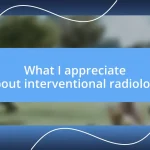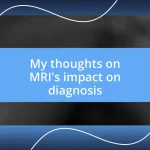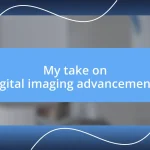Key takeaways:
- Personalized medicine tailors treatments to individual genetic profiles, enhancing efficacy and reducing trial-and-error in healthcare.
- Experiences with pharmacogenomic testing revealed the power of data-driven decisions, leading to significant positive changes in personal health outcomes.
- The future of personalized medicine may be revolutionized by technology, enabling real-time health monitoring and active patient participation in treatment planning.

Understanding personalized medicine
Personalized medicine, at its core, tailors medical treatment to the individual characteristics of each patient. I remember the first time I learned about pharmacogenomics, the study of how genes affect a person’s response to drugs—it was like a light bulb moment. I vividly pictured a world where our DNA could dictate the most effective medication, essentially crafting a prescription uniquely suited to our biological makeup.
What excites me the most is how this approach shifts the paradigm from a one-size-fits-all model to a more nuanced understanding of health. Have you ever thought about how frustrating it can be to try multiple treatments before finding the right one? I certainly have, and it deepens my appreciation for the potential of personalized medicine to reduce that trial-and-error process and improve outcomes for individuals struggling with complex conditions.
Moreover, this field isn’t just about medications; it encompasses lifestyle choices, nutrition, and preventive measures based on genetic predispositions. Thinking about my own health journey, I find it incredibly empowering to consider how insights from my genetic profile could guide my diet or exercise routine. This intersection of genomics and personal health offers a promising future, inviting us to understand our bodies on a profound level.

First experiences with personalized treatment
One of my earliest experiences with personalized treatment was with a pharmacogenomic test. I remember the anticipation I felt as I awaited the results, hoping they would illuminate the best medication for my chronic migraines. When the report revealed that a specific drug was more likely to be effective for me due to my genetic makeup, it was a relief—almost like finding the missing piece of a puzzle I had been trying to solve for years.
I also vividly recall discussing my results with my doctor. The look on her face as she explained how my body metabolizes drugs differently struck me. It was empowering to hear that we weren’t just guessing anymore; we had data tailored to me. This moment made it clear just how influential personalized medicine can be in housing better outcomes, and it sparked my passion for exploring further.
Seeing the tangible results of personalized treatment left me in awe. After just a few weeks on the recommended medication, my migraines reduced significantly. The emotional weight was heavy—I felt like a new person, relieved from the grip of pain. It made me believe deeply in the potential of personalized medicine to transform lives, not just in theory but in real, impactful ways.
| Experiences | Emotions |
|---|---|
| Pharmacogenomic test results | Relief and anticipation |
| Discussing results with my doctor | Empowerment and clarity |
| Tangible results from treatment | Awe and new beginnings |

Key challenges I faced
Navigating the world of personalized medicine presented me with unexpected challenges that often felt overwhelming. One of the biggest hurdles I faced was the sheer complexity of genetic data. I remember poring over reports, trying to grasp how specific genes interconnected and influenced treatment decisions. It was a bit like deciphering a foreign language—exciting, yet daunting.
- Deciphering intricate genetic reports
- The fear of misinformation and misinterpretation
- Coordination between various healthcare providers
- Time and cost associated with testing and treatments
I also confronted the emotional toll that uncertainty brought. As I sought personalized approaches, I struggled with moments of doubt. There were instances when I felt discouraged by the lack of immediate results or the need to adjust treatment several times. Each alteration stirred up a mix of hope and anxiety, leaving me wondering if I would ever find the right path for my health journey.

Tools that aided my journey
When I look back on the tools that aided my journey through personalized medicine, one stands out: the DNA testing kit I used at home. Honestly, I was initially hesitant; could a small sample really provide insights into my health? However, the moment I received my results, it was like opening a window to my genetic landscape, revealing predispositions and potential responses to medications. I felt a mix of excitement and empowerment, realizing I could play an active role in my healthcare decisions.
Another vital tool in my journey was a health monitoring app that tracked my symptoms and treatment responses. At times, it felt tedious to log my daily experiences, but those entries turned into valuable data that I shared with my healthcare providers. I remember that moment of clarity during a follow-up appointment when my doctor pointed out trends in my symptoms over time. It made me wonder—how often do we overlook the power of our everyday observations in shaping our health narratives?
Lastly, I can’t forget the support I received from online communities focused on personalized medicine. The conversations I had with others facing similar struggles provided both comfort and crucial tips I hadn’t considered. There was one individual whose story about their experience with a specific medication resonated deeply with me. I thought, if we can harness the power of shared experiences, why aren’t more people talking about this? It’s fascinating how connection can transform a solitary journey into something much larger and more impactful.

Success stories and outcomes
The success stories I’ve encountered in personalized medicine are nothing short of inspiring. One moment that stands out was when a friend of mine shared his experience with a tailored treatment plan for his chronic condition. After years of trial and error, he finally found a regimen that not only improved his symptoms but also revitalized his outlook on life. Watching him embrace activities he once thought were lost to his illness had a profound impact on me.
Another powerful example comes from my own journey. After diligently working with my healthcare team to analyze my genetic data, I received a tailored medication plan that transformed my approach to health. I’ll never forget the relief I felt during a follow-up appointment when my doctor shared the positive changes visible in my lab results. The sense of ownership over my health, knowing my treatment was based on my unique biology, ignited a newfound enthusiasm that I didn’t know I was missing.
Having witnessed such outcomes, I often ponder: what if everyone could access a similar journey? The potential for personalized medicine to change lives is immense. As I reflect on these success stories, I can’t help but feel a surge of hope. It reminds us that with the right tools and support, we’re not just passive recipients of healthcare, but active participants in shaping our health narratives.

Future outlook on personalized medicine
The future of personalized medicine looks incredibly promising. I often think about how advancements in technology, like artificial intelligence and genomic sequencing, will redefine how we approach healthcare. Imagine a world where treatments are not just tailored but dynamically adjusted based on real-time data from our bodies—it’s exciting to envision!
I recall a discussion with a fellow patient about the potential for wearable devices to monitor health continuously. We pondered how this data could help doctors make more informed decisions. It’s a game changer when decisions aren’t based on what happened weeks ago, but on current, precise information about our health. How many times have I felt frustrated waiting for results? This could eliminate that uncertainty.
Looking ahead, I can’t help but feel optimistic about the growing emphasis on patient involvement in personalized care. Just the thought of patients having access to their genetic information and actively participating in their treatment planning gives me hope. Will we soon see a shift where empowering patients becomes the norm rather than the exception? I genuinely believe this could lead to not only better health outcomes but also a stronger doctor-patient relationship.














